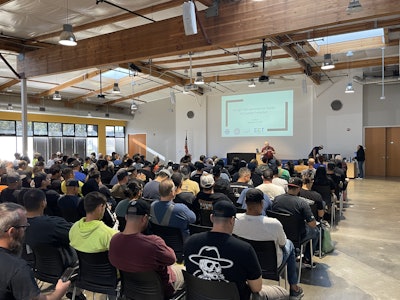
The construction industry, long defined by its rigorous demands and resilience, is undergoing a transformative shift in addressing mental health and well-being. Deanna "D" Murchison, Secretary & Coordinator of the Electrical Contractors Trust (ECT) of Alameda County, has been at the forefront of this movement, advocating for open conversations, resources, and support for workers and apprentices.
Located near the San Francisco Bay Area, Alameda County encompasses metro Oakland and stretches eastward. Murchison, who has served in her role for 21 years, has witnessed significant changes. Through her leadership and the collective efforts of the ECT Board and other stakeholders, mental health is no longer a silent struggle and has become a recognized and supported priority.
With approximately 2,000 journey-level workers, 220 current apprentices, and 750 retirees representing Local #595 of the International Brotherhood of Electrical Workers (IBEW), the ECT of Alameda County serves around 140–160 union electrical contractors. Mental health has always been a concern for the ECT Board, but the COVID-19 pandemic brought these issues into sharper focus. “The pandemic heightened our awareness,” Murchison recalls. Stories of business owners and workers grappling with stress underscored the depth of the problem. However, the tragic suicide of a foreman became the turning point—a stark reminder of mental health’s real impacts and warning signs.
In March 2023, Murchison and her team were inspired by a comprehensive workplace mental health class hosted in Oklahoma by the Joint Apprenticeship and Training Committee (JATC) of Local #1141 of IBEW and the Oklahoma Chapter of the National Electrical Contractors Association (NECA). Facilitated by Cal Beyer, the session was pivotal. Murchison, introduced to Beyer by Josh Bone, Executive Director of ELECTRI International (a research foundation for the electrical industry), found a strong ally in addressing mental health within the electrical industry.
A Unified Approach
Addressing mental health in an industry traditionally hesitant to discuss it required a unified effort. “Initially, there was some apprehension,” Murchison admits. Over time, perceptions shifted as the ECT Board, JATC, IBEW Local #595, and NECA Chapter of Northern California collaborated to expand mental health and well-being training. Together, they fostered a culture of awareness and education, creating safe and healthy workplaces. Contractors, instructors, and apprentices embraced this shift, recognizing the importance of prioritizing mental well-being.
In August 2023, Beyer led a professional development session for JATC instructional staff, followed by a large group session in September that included all apprentices, ECT Board members, and NECA representatives. Discussions centered on mental health, substance use and misuse, suicide prevention, overdose awareness, and preventive health services available through the union’s health and welfare fund.
 Apprenticeship Training on Mental Health, Substance Use and Suicide PreventionDeanna Murchison
Apprenticeship Training on Mental Health, Substance Use and Suicide PreventionDeanna Murchison
ECT Vice Chair Rebecca Anderson, President of Beci Electric Inc., applauded the initiative: “Kudos to all stakeholders for your continuous work with providing all of this mental health education to help our members.” Anderson continued in stating, “this education brought mental health out in the open, where struggles are not uncommon, and our members now have a greater understanding of available help.
Murchison’s personal journey highlights the generational and gender differences in attitudes toward mental health. Her daughters, both Division I college softball athletes, questioned her advocacy because she was not known to them for her sensitivity. This prompted her to reflect on her upbringing. “I’m from the ‘suck it up’ generation,” she shares, where emotional struggles were often overlooked, because if you were depressed you must not be doing enough. We now know this is not a way to live. Her daughters’ perspectives underscored the importance of evolving attitudes and embracing the uniqueness of everyone’s mental health journey. “I’ve learned that change is possible,” she says, “and I’m proof of that.”
With over 30 years in the trade and as the spouse of a union electrician, Murchison has witnessed the ripple effects of mental health investments. Supervisors and coworkers now normalize discussions about mental health.
One standout moment occurred during a training session for instructors, focused on equipping them with tools for their classrooms and prioritizing their own well-being. “It was our best class yet,” Murchison recalls, with discussions so engaging they exceeded the allotted time. These initiatives, supported by the IBEW’s wellness program and NECA’s mental health training, continue to strengthen the industry’s commitment.
Jennifer Fothergill, Business Development/Governmental Affairs for NECA’s Northern California Chapter, lauded these efforts: “Having these important conversations and providing a multitude of resources is invaluable. I feel so proud and honored to be part of such impactful discussions.”
Overcoming Challenges
Implementing mental health initiatives hasn’t been without challenges. A significant hurdle has been the evolving nature of Employee Assistance Programs (EAPs). “COVID left hospitals overwhelmed with mental health requests,” Murchison explains.
Partnerships with organizations like SAFE Project have been vital in providing immediate human connections during crises and directing members to appropriate medical plans. For instance, apprentices received critical incident response within 24 hours of a tragedy, thanks to EAP support.
Jason Bates, Training Director of JATC for IBEW Local #595, highlights the impact of these efforts: “Thank you to all our partners for all the work and coordination you’ve done with us over the years. Your dedication has made a meaningful impact, ensuring our students feel supported and empowered to prioritize their well-being”. Bates continued, “I look forward to overcoming individual challenges with new mental health tools and resources we now have to pull from.”
For Murchison, learning about mental health has been empowering. “To keep something, you have to give it away,” she says, emphasizing the importance of sharing knowledge. She recalls a poignant moment during a JATC blood drive when a phlebotomist expressed interest in joining their team after witnessing the camaraderie and positivity. Such moments reaffirm the importance of offering support, resources, and guidance. “When we live well and prioritize mental health,” Murchison reflects, “we naturally inspire others to do the same.”
The construction industry’s commitment to mental health is creating a legacy of support and understanding. Murchison and her collaborators continue refining their approach to ensure timely responses and effective resources. “Your efforts ensure our students feel supported and empowered to prioritize their well-being,” she concludes. “Together, we’re building a healthier, more resilient workforce.”




















